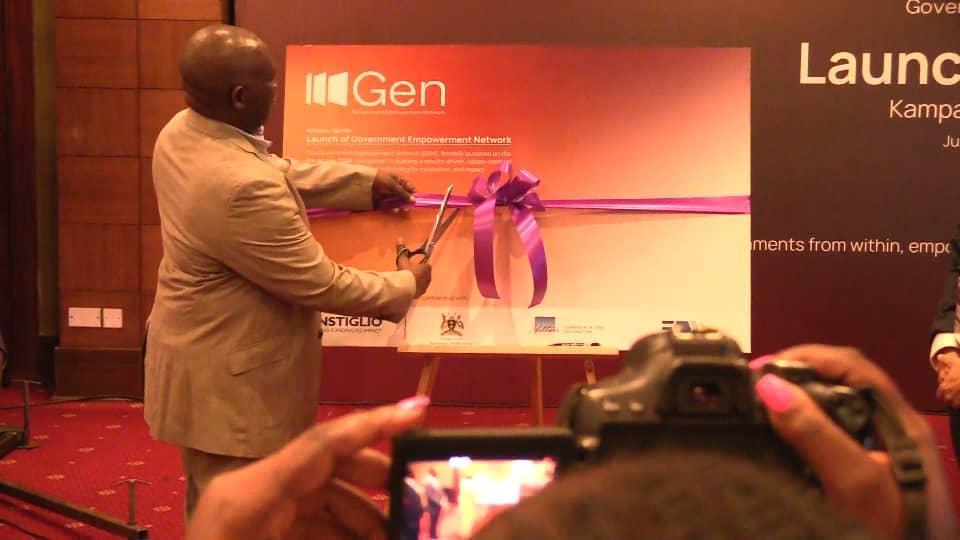Africa-Press – Uganda. The government has launched a new initiative dubbed the Government Empowerment Network (GEN) to revamp the country’s civil service and improve public service delivery.
Spearheaded by Minister of Public Service Muruli Mukasa, the initiative marks a pivotal step in efforts to modernize state operations and rebuild public trust in government institutions.
GEN is the result of a strategic partnership between the Ministry of Public Service and INSTIGLIO, a global non-profit advisory firm known for its work in results-based public sector reform.
Together, the partners aim to address long-standing inefficiencies in government systems through a multi-pronged approach focused on leadership, training, and digitization.
Speaking at the launch, Minister Mukasa described GEN as a game-changing intervention for Uganda’s public administration.
“This is not merely a program; it’s a fundamental shift in our approach to public service,” he said.
“The Government Empowerment Network is designed to empower our civil servants, providing them with the tools, training, and support they need to excel in their roles and deliver exceptional service to the Ugandan people.”
Central to GEN’s design is the appointment of champions from various ministries and government departments.
These individuals will serve as key change agents, bridging the gap between high-level reform strategies and day-to-day administrative operations.
The champions are tasked with identifying inefficiencies, implementing innovations, and maintaining feedback loops with the GEN secretariat to ensure adaptive reform across government units.
The selection process prioritized leadership aptitude, commitment to public service, and a demonstrated ability to deliver results.
These champions are expected not only to drive internal change but also to foster a culture of continuous learning and accountability within their institutions.
The launch event also drew high-level support from senior government officials, including Aggrey Kibenge, Permanent Secretary at the Ministry of Gender, Labour and Social Development. Kibenge praised the initiative as a necessary reset for Uganda’s public sector.
“This network is a vital step towards creating a more responsive, efficient, and effective government,” he said.
“Empowering our civil servants directly empowers the citizens they serve. By providing them with the necessary resources and support, we are investing in a brighter future for Uganda.”
Kibenge also highlighted the need for greater collaboration between government ministries, stressing that transformation in service delivery would require more than individual efforts.
“We cannot afford to work in silos. This is a call to every government worker to embrace teamwork across ministries,” he urged.
Uganda’s civil service, like many in the region, faces multiple challenges including bureaucratic inertia, limited technological integration, and under-resourced departments.
GEN seeks to address these issues through targeted investment in digital tools, specialised training for public officers, and a system of measurable performance indicators to track progress and enhance accountability.
Mukasa reiterated that improving service delivery is not just a technical goal but a political imperative.
“Citizen satisfaction is the foundation of legitimacy. A government that delivers efficiently gains the confidence of its people,” he noted.
As part of the GEN rollout, ministries will undergo baseline assessments to identify gaps in service delivery.
Tailored solutions will then be designed, ranging from digitization of workflows to on-site coaching for senior officials.
INSTIGLIO will provide technical guidance throughout the implementation phase, drawing from its experience in similar reforms across Latin America, South Asia, and Africa.
The initiative is also expected to attract further donor support, given its emphasis on sustainable systems rather than short-term fixes.
According to government insiders, the GEN model may eventually be institutionalized within the Ministry of Public Service to ensure continuity beyond the current political cycle.
While GEN’s ambitions are lofty, its success hinges on practical delivery and the commitment of civil servants across the board.
“It’s one thing to announce reform, and another to live it daily in the office,” one mid-level ministry official said privately. “But we are hopeful.”
Observers are now watching closely to see whether the GEN framework can achieve real impact and become a blueprint for other African governments seeking to modernize their public sectors.
If successful, the initiative could usher in a new era of citizen-centered governance in Uganda — one where the civil service is no longer seen as inefficient and distant, but as a dynamic partner in national development.
For More News And Analysis About Uganda Follow Africa-Press






